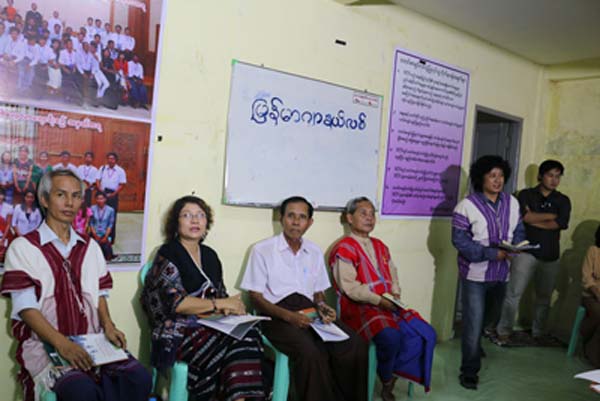Posts Tagged ‘Dams’ (50 found)
ေဘာကထာ ေရအားလွ်ပ္စစ္စီမံကိန္းအေပၚ IKO ၏ သေဘာထားထုတ္ျပန္ခ်က္
၁။ ၈/၀၂/၂၀၁၆ ရက္ေန႔ ေဘာကထာေခ်ာင္း ေရအားလွ်ပ္စစ္စီမံကိန္းႏွင့္ပတ္သက္ၿပီး ဗမာအစိုးရ လွ်ပ္စစ္စြမ္း အား စီမံေရးဦးစီးဌာနႏွင့္ KNU သူးေလကုမၸဏီလီမီတက္တို႔မွ MOU နားလည္မႈစာခၽြန္လႊာ လက္မွတ္ေရးထုိး လိုက္ျခင္းအေပၚ ကရင္အရပ္ဖက္အဖြဲ႔အစည္းမ်ား၊ ကရင္ျပည္သူလူထုမ်ားမွ ေ၀ဖန္မႈမ်ားရွိခဲ့သလို KNU ထိပ္ပိုင္း ေခါင္းေဆာင္အတြင္းမွလည္း မေျပမလည္ေျပာဆိုသံမ်ား ထြက္ေပၚလာခဲ့သည္ […]
• • •Save The Salween Network Statement
Plans to build dams on the Salween River, started by the previous military regime, have recently been accelerated by U Thein Sein’s government, which, on February 2, 2016, without informing or consulting Burma’s citizens, signed an agreement with China allowing implementation of 18 out of 29 hydropower dam projects planned by Chinese companies in Burma […]
• • •Open letter to SMEC by Karli-KunHing People
We believe you know well about the situation on the ground in ethnic states, where current ceasefire agreements are fragile. There has been continued fighting and increased militarization by the Burma Army, particularly in Shan State and Kachin State, after re-signing of ceasefire agreements, which is endangering innocent civilians’ lives. Fighting broke out recently in our township Kunhing in late August 2015, and the Burma Army arrested innocent villagers who live on the Pang River […]
• • •Shans Present 23,717 Signatures against Salween Dams to Australian Consultants in Yangon
Shan community representatives are today presenting 23,717 signatures opposing the building of dams on the Salween River to the Australian company Snowy Mountains Engineering Corporation (SMEC) at their office in Yangon […]
• • •Mon and Karen State Residents Fear Increased Flood Risk from Salween Dams
The Save the Salween Network is holding a press conference today in Moulmein, the Mon State capital, to raise concerns about downstream impacts of the planned Salween dams, including the increased risk of flooding […]
• • •Halt All Dams Now in Salween River and All Ethnic Areas – Protests At Dam Sites
On the International Day of Action for Rivers and Against Dams, Karen Rivers Watch renews its call for the suspension of all dam projects in Karen State and other ethnic states […]
• • •New Burma Army offensive in Karen State linked to Salween dam plans
Salween Watch is gravely concerned at the recent escalation of fighting and displacement in Karen state, Burma/Myanmar, which is linked to plans by the Burma Army to clear the way for the planned Hut Gyi Dam on the Salween […]
• • •Karen Civil Society Rallies Around Japan’s Harmful Plans for Eastern Burma
 Japan’s lofty development plans for eastern Burma were very publicly rejected by the Karen Peace Support Network (KPSN) at a press conference in Rangoon, citing lack of consultation with communities and the potential for such plans to fuel conflict. Based on a blueprint for extensive development projects produced by the Japanese International Cooperation Agency (JICA), the overseas development arm of the Japanese government, 28 Karen civil society organizations that form the KPSN, released a report to outline their concerns and recommendations. JICA’s blueprint, in which its main goal is to support the return of refugees and internally displaced persons (IDPs), contains four main components; economic corridors, free trade zones and industrial estates, industrial clusters, and urban development. The Japanese government has been working closely with both the Union level and State level Burmese Government in the development of this plan.
Japan’s lofty development plans for eastern Burma were very publicly rejected by the Karen Peace Support Network (KPSN) at a press conference in Rangoon, citing lack of consultation with communities and the potential for such plans to fuel conflict. Based on a blueprint for extensive development projects produced by the Japanese International Cooperation Agency (JICA), the overseas development arm of the Japanese government, 28 Karen civil society organizations that form the KPSN, released a report to outline their concerns and recommendations. JICA’s blueprint, in which its main goal is to support the return of refugees and internally displaced persons (IDPs), contains four main components; economic corridors, free trade zones and industrial estates, industrial clusters, and urban development. The Japanese government has been working closely with both the Union level and State level Burmese Government in the development of this plan.
For Karen civil society, however, there are many concerns, as outlined in the report released on 9 September. Although the blueprint aims to “promote peace through development,” JICA has not conducted a conflict analysis on what is an extremely complicated and fragile context. In fact the plans could serve to exacerbate conflict by facilitating land confiscation, one of the loci of tension in the ceasefire process. Also, improving transport and road access to areas traditionally held by ethnic armed groups such as the Karen National Union (KNU), allows easy access for Burma Army soldiers to the heart of Karen areas. We must not forget the abusive nature of the Burma Army that has been terrorizing civilians for decades and continues to do so, despite a ceasefire in place. Will exposing more communities, who are already vulnerable to abuses, to the unreformed Burma Army really aid peace […]
• • •Joint Submission on the Proposed World Bank Group’s Country Partnership Framework (CPF) in Myanmar
We, the undersigned organizations in Myanmar and other countries, respectfully submit these comments to the World Bank Group to inform the development of the Country Partnership Framework for Myanmar. We belong to civil society organizations and ethnic community networks with a focus on human rights, environment, peace and mediation, and good governance with significant expertise and experience in Myanmar […]
• • •








 All posts
All posts